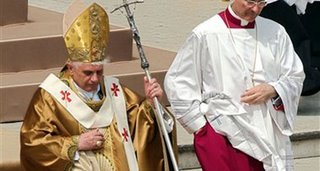
You have most likely all read about the most recent Popescandal. Our friend Ratzo does have a sharp tongue for a pope. Or perhaps that tall hat of his is not used to hide a thermos and some sandwiches but the holy foot which can conveniently be inserted in the mouth whenever needed.
You must have figured that I didn't think the Pope's speech on the opinions of a fourteenth century emperor was that well thought out. This is what he said:
From Pope Benedict XVI's address at the University of Regensburg:
"[Byzantine emperor Manuel II Paleologus] turns to his interlocutor somewhat brusquely with the central question on the relationship between religion and violence in general, in these words: 'Show me just what Mohammed brought that was new, and there you will find things only evil and inhuman, such as his command to spread by the sword the faith he preached.' The emperor goes on to explain in detail the reasons why spreading the faith through violence is something unreasonable.... The decisive statement in this argument against violent conversion is this: Not to act in accordance with reason is contrary to God's nature. The editor, Theodore Khoury, observes: For the emperor, as a Byzantine shaped by Greek philosophy, this statement is self-evident. But for Muslim teaching, God is absolutely transcendent. His will is not bound up with any of our categories, even that of rationality."
The defense I have seen most often is that Pope Benedict is just a shy academic, in heart, and that he was totally unafraid of the furor that his comments would provoke. I doubt that explanation. He has been a member of the Catholic hierarchy for a very long time and surely knows better than that:
Some say this was a case of naivety, of a scholarly theologian stumbling into the glare of a global media storm, blinking with surprise at the outrage he had inadvertently triggered. The learned man's thoughtful reasoning, say some, has been misconstrued and distorted by troublemakers, and the context ignored.
But such explanations are unconvincing. This is a man who has been at the heart of one of the world's multinational institutions for a very long time. He has been privy to how pontifical messages get distorted and magnified by a global media. Shy he may be, but no one has ever before accused this pope of being a remote theologian sitting in an ivory tower. On the contrary, he is a determined, shrewd operator whose track record indicates a man who is not remotely afraid of controversy. He has long been famous for his bruising, ruthless condemnation of those he disagrees with. Senior Catholic theologians such as the German Hans Kung are well familiar with the sharpness of his judgments.
But in the 18 months since Benedict was elected, the wary critics who have always feared this man were lulled into believing that office might have softened his abrasive edges. His encyclical on love won widespread acclaim and the pronouncement on homosexuality being incompatible with the priesthood (and its inference that homosexuals were to blame for the child sex abuse problems in the church) were explained away as an inheritance from Pope John Paul II's reign.
But while the Pope has tried to build a more appealing public image, what has become increasingly clear is that this is a man with little sympathy or imagination for other religious faiths. Famously, the then Cardinal Ratzinger once referred to Buddhism as a form of masturbation for the mind - a remark still repeated among deeply offended Buddhists more than a decade after he said it. Even his apology at the weekend managed to bring Jews into the row.
And what are the likely consequences of this Popefuror? Who knows for sure. But it's worrying:
With extremists successfully exploiting popular anger over comments like the pope's or at cartoons critical of Islam, this fringe view has moved closer to the center, often undermining more-moderate views, analysts say.
"Arabs and Muslims feel oppressed by the West. Afghanistan and Iraq are features, but most important is Palestine ... and all of this built-up anger then sometimes explodes,'' says Abdel Wahab al-Messiri, an Islamist thinker and professor in Cairo. "The anger at the West can't be expressed through the popular channels because of their own regimes, so they wait for something like cartoons or the pope's comments and their totalitarian governments can't stop them because that would be something un-Islamic."
...
Al Qaeda formally refers to itself as the "Global Front for Jihad Against Crusaders and Jews" and its propaganda seeks to convince Muslims that there is a new, US-led crusade against Islam.
While still only a small minority of Muslims buy into this worldview, their visibility has seemed to grow recently. On Monday, the Mujahidin Shura Council, the chief mouthpiece for Al Qaeda in Iraq, said Bush was leading a "new crusade" and, addressing the pope, said: "We will destroy the cross... then all that will be accepted will be conversion or [death]."
Good news, huh? I must admit that neither of the religions involved in this fracas has exactly risen in my esteem.
The Guardian article I linked to above gives another of the Pope's recent statements, this time one about women who want to be priests:
On the excommunication of seven women who called themselves priests: "... the penalty imposed is not only just, but also necessary, in order to protect true doctrine, to safeguard the communion and unity of the church, and to guide consciences of the faithful."
How very powerful female priests would be. The Catholic Church in Germany never excommunicated Hitler...